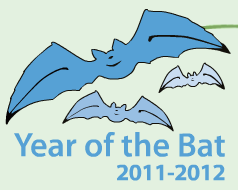Noting that bats are essential predators that keep many damaging insects from destroying crops, Tuttle outlines the “biological control” ecosystem service provided by bats.
 21 January 2011: The UN Environment Programme (UNEP) Honorary Ambassador for the Year of the Bat Campaign, ecologist Merlin Tuttle, has outlined the role of bats as pollinators, pesticides, fertilizer and tourism attractions. According to Tuttle, bats remain misunderstood, feared and persecuted.
21 January 2011: The UN Environment Programme (UNEP) Honorary Ambassador for the Year of the Bat Campaign, ecologist Merlin Tuttle, has outlined the role of bats as pollinators, pesticides, fertilizer and tourism attractions. According to Tuttle, bats remain misunderstood, feared and persecuted.
On the importance of bats for pollination, Tuttle notes bananas, plantain, breadfruit, peaches, mangos, dates, figs and cashews are all dependent on pollination by bats. He states that approximately 70% of tropical fruit sold comes from trees or shrubs that rely heavily on bats in the wild.
Noting that bats are essential predators that keep many damaging insects from destroying crops, Tuttle outlines the “biological control” ecosystem service provided by bats. He cites examples of bats being used as an alternative to pesticides in cotton growing areas, saving farmers millions of dollars in pesticide costs.
Tuttle also emphasizes the extraction of bat guano for fertilizer as an invaluable renewable resource for communities in developing countries from Asia and Africa to Latin America.
According to UNEP, Year of the Bat 2011-2012 is a global campaign to promote conservation, research, and education about the world’s only flying mammals. Year of the Bat is supported by UNEP, the Convention on the Conservation of Migratory Species and EUROBATS, as well as numerous partner organizations around the world. [UNEP Press Release] [Year of the Bat website]